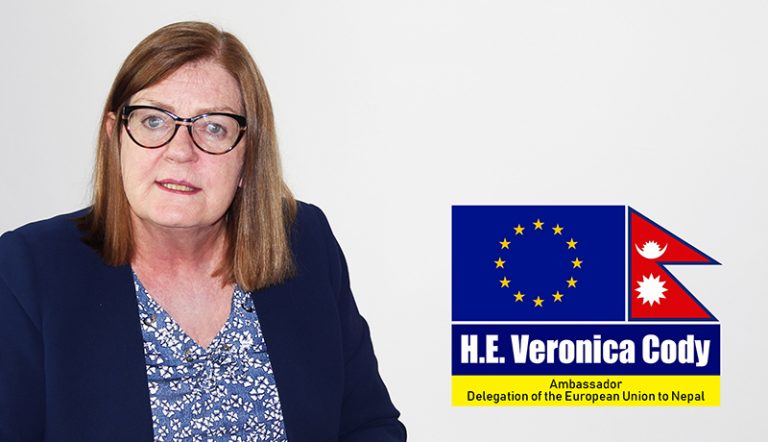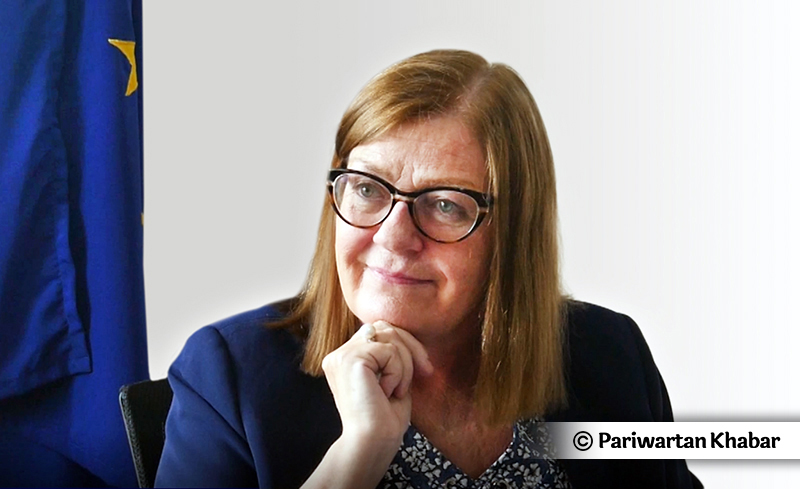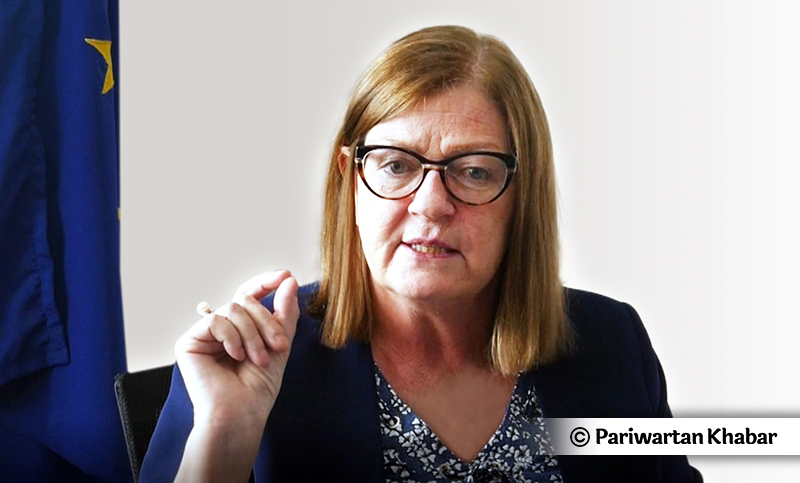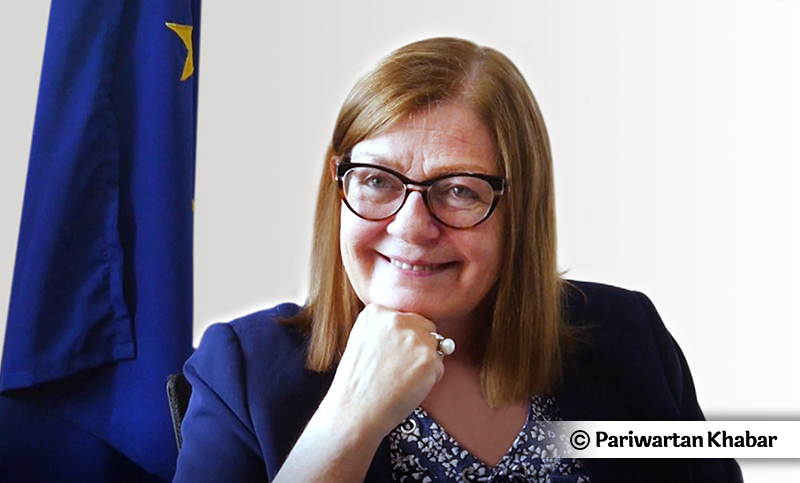
06 July 2019, Kathmandu
It has been 45 years since Nepal and European Union established their diplomatic relationship. The EU is assisting Nepal in education, health, agriculture, and good governance among others through its country office in Kathmandu. EU has now become an important development partner of Nepal. Hari Prasad Paudel of Pariwartan Khabar talked to the EU ambassador Veronica Cody on the EU- Nepal issues and its upcoming plans. Excerpts:

What is your mandate as an Ambassador of the European Union to Nepal?
It’s a great privilege and great responsibility to be the EU Ambassador to Nepal. I am here to promote our founding principles and foster our long-run relationship. My mandate is to engage with the Nepali government and society to work together in Nepal’s interest.
How are Nepal and EU working together currently?
We are not new partners rather our relations is matured by 45 years. Nepal is transiting out of the conflict with the 2017 election, new constitution, and federalism. Nepal has entered into a new phase of development and the EU is here to continue its partnership as it was in the past phase.
Comparing now to then, what are the priority areas of the EU in Nepal?
There are some key challenges of Nepal which are existing since last two to three decades. These challenges are education, health, agriculture, good governance, and democracy. These areas are still the key focus of the EU even today. In current years, the progress in education is clearly seen. Changes have been seen in these areas but we cannot stop our activities now. These areas are still the key areas of our priority in Nepal.
Nepal has owned low skilled and unskilled manpower as well. Is the EU interested to invest in technical and vocational training for Nepali youths?
It is one of the key challenges of Nepal. Nepal has a large number of young people leaving to emigrate and many of them are low skilled. It would be obviously more beneficial to keep those young men in the country. If you can give them the right skill, they will be able to take up the right opportunities. We are working with the youths of Nepal on technical and vocational training in the hospitality sector for example. We train young students in reception, cooking, and some other skills. We are providing training for youths in the hospitality and tourism fields. As Nepal is preparing for Visit Nepal 2020 and expecting to welcome a double number of tourists, we can develop skills of youths for this sector. Youths can be trained in agriculture, horticulture, organic fertilizers, etc. Not only producing rather packaging, branding and getting the high-end of the product will give a good sum of money.
Are you playing any role to globalize Nepali product?
In this respect, we should take the big picture first. The EU offers trade preferences to Nepal. Nepal can have tariff free excess to the European market for all it’s product except for arms. All the profit goes back to Nepali producers. It can help, incentivize and assist the economy of least developed countries by exporting their products.

As a diplomat of the European Union, what is your suggestion for Nepal to make Visit Nepal 2020 successful? What is the EU doing on it?
We are thinking on this matter. In the past, we cooperated with Tourism Board to make a promotional video containing beautiful sceneries, music, spiritual stations, landscapes, diversity of Nepal and many more. For 2020, we might look at various events like music events, joint hospitality events among others. We will have to plan on it along with the government of Nepal and the tourism board.
In your assumption, where would be Nepal in the next decade?
Well, I haven’t got a crystal bowl. It’s a very good question because we are coming to the end of our seven-year programming cycle. We are planning the new financial cycle which will be a seven-year cycle. So we are also looking where Nepal will be in the next seven years time. I think Nepal is in a very interesting phase of development. I think a lot is going to happen in Nepal in 10 years. A huge amount can happen in a decade. It is for us to be part of an engine that makes change happens. For example, federalism is a huge project. It could be a tremendous motor to change in so many ways. If it’s done properly, it can be a huge trigger for both economic growth and decentralization. It definitely promotes the engagement of the citizens in government and the development of their own provinces. It also brings up standards in the services and goods at the local level. For example, parents can go to their locally elected representatives to improve education. This makes the whole system more accountable and transparent. I have a good experience from my own country where decentralization brought drastic economic growth. It should be practiced in equity, inclusive and just way. Moreover, provincial and local government should be given resources to deliver the service.
What are the key challenges that you have faced working as the ambassador to Nepal?
Well, any new country is the key challenge itself. In my previous posting in Brussels, I was the head of South Asia in the external action service. So, I dealt with India, Bangladesh, Nepal, and Bhutan. But it’s one thing to deal with a country when I am sitting in Europe and it is quite another thing to deal with the country when I am here in Kathmandu.
First of all, getting to know the country simply is the key challenge. It is a pleasure to be here in an amazing place having so many different facets. But, it is not all of Nepal. The first thing I did when I came to Nepal was to visit other provinces. I have been to Pokhara, Lumbini, Nepalgunj, Surkhet, Nawalparasi, Rapti Sonari and Kalikot of Karnali province. Though I have not been to all provinces yet, I intend to travel widely and see our projects throughout the country. This has shown me not my challenges actually but the challenges of Nepal.

The challenges for Nepal is the diversity and the difference between the living condition of people between Karnali and Kathmandu province. It is very different due to infrastructure, inaccessibility, and remoteness. In Rapti Sonari for example, we are engaged in a project of helping the people deal with flooding and helped to build handpump to provide clean water. This eliminates the spread of disease. We provided lifeboats for them and built shelters. I visited coffee plantations and retail outlets as well in Kavre and Pokhara. We offered the young people training and advice in organic farming. We advised them to add value to their products by roasting and branding beyond just harvesting. In the occasion of Europe Day on 9th May, we sent sachets of organic Himalayan Nepal grown coffee to Brussels. Everybody loved it because Nepal has a very positive image in Europe. Everybody thinks Nepal as a very proud and resilient country with highest mountain and beautiful temples. A product from Nepal is a special product.
What would be the best thing that you will miss from Nepal?
Well, that is the difficult just choosing one thing. I think it is a very difficult question. There are so many things. I think first of all the equanimity and the tremendous welcome. Of course, I will miss the Nepali people.
How would you comment on the current media act of Nepal?
Well, I think it is extremely important that media have the freedom to express examining the reality of action on the ground to local policies and programs. Unnecessary restrictions on media stifle the voice of freedom of the press. As you know, the European Union speaks very strongly on the freedom of expression as one of the components of human rights. Media needs to be free in order to reflect people’s opinion.
It is also blamed that EU is promoting Christian faith-based organizations in Nepal. How would you comment?
Well, that is a very simple question and the answer is no. We are not supporting proselytization. We support freedom of religion as we support freedom of expression.
Interview video with H.E. Veronica Cody :
Please Read This Also in Nepali Version:










